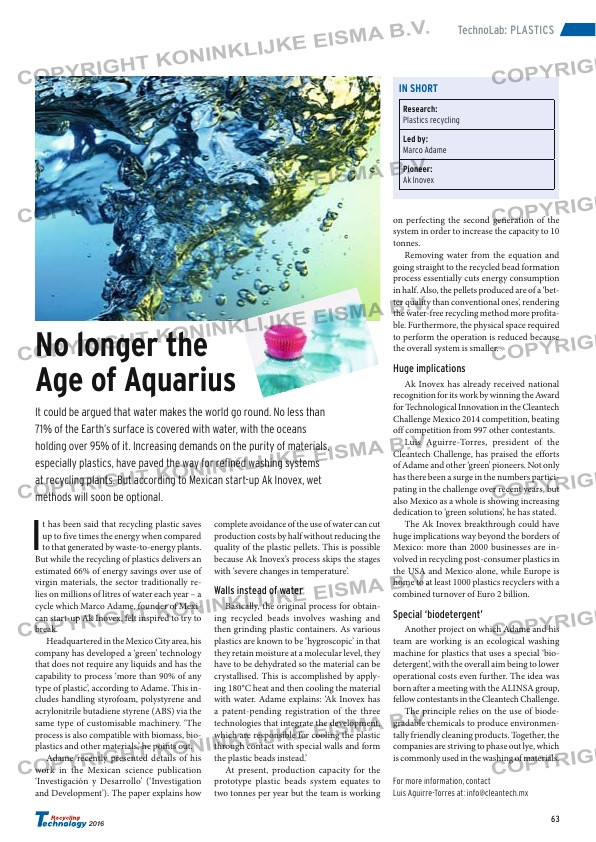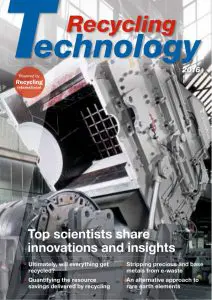Page 61 from: Recycling Technology 2016

63
2016
TechnoLab: PLASTICS
No longer the
Age of Aquarius
It could be argued that water makes the world go round. No less than
71% of the Earth’s surface is covered with water, with the oceans
holding over 95% of it. Increasing demands on the purity of materials,
especially plastics, have paved the way for refined washing systems
at recycling plants. But according to Mexican start-up Ak Inovex, wet
methods will soon be optional.
I
t has been said that recycling plastic saves
up to five times the energy when compared
to that generated by waste-to-energy plants.
But while the recycling of plastics delivers an
estimated 66% of energy savings over use of
virgin materials, the sector traditionally re-
lies on millions of litres of water each year – a
cycle which Marco Adame, founder of Mexi-
can start-up Ak Inovex, felt inspired to try to
break.
Headquartered in the Mexico City area, his
company has developed a ‘green’ technology
that does not require any liquids and has the
capability to process ‘more than 90% of any
type of plastic’, according to Adame. This in-
cludes handling styrofoam, polystyrene and
acrylonitrile butadiene styrene (ABS) via the
same type of customisable machinery. ‘The
process is also compatible with biomass, bio-
plastics and other materials,’ he points out.
Adame recently presented details of his
work in the Mexican science publication
‘Investigación y Desarrollo’ (‘Investigation
and Development’). The paper explains how
complete avoidance of the use of water can cut
production costs by half without reducing the
quality of the plastic pellets. This is possible
because Ak Inovex’s process skips the stages
with ‘severe changes in temperature’.
Walls instead of water
Basically, the original process for obtain-
ing recycled beads involves washing and
then grinding plastic containers. As various
plastics are known to be ‘hygroscopic’ in that
they retain moisture at a molecular level, they
have to be dehydrated so the material can be
crystallised. This is accomplished by apply-
ing 180°C heat and then cooling the material
with water. Adame explains: ‘Ak Inovex has
a patent-pending registration of the three
technologies that integrate the development,
which are responsible for cooling the plastic
through contact with special walls and form
the plastic beads instead.’
At present, production capacity for the
prototype plastic beads system equates to
two tonnes per year but the team is working
on perfecting the second generation of the
system in order to increase the capacity to 10
tonnes.
Removing water from the equation and
going straight to the recycled bead formation
process essentially cuts energy consumption
in half. Also, the pellets produced are of a ‘bet-
ter quality than conventional ones’, rendering
the water-free recycling method more profita-
ble. Furthermore, the physical space required
to perform the operation is reduced because
the overall system is smaller.
Huge implications
Ak Inovex has already received national
recognition for its work by winning the Award
for Technological Innovation in the Cleantech
Challenge Mexico 2014 competition, beating
off competition from 997 other contestants.
Luis Aguirre-Torres, president of the
Cleantech Challenge, has praised the efforts
of Adame and other ‘green’ pioneers. Not only
has there been a surge in the numbers partici-
pating in the challenge over recent years, but
also Mexico as a whole is showing increasing
dedication to ‘green solutions’, he has stated.
The Ak Inovex breakthrough could have
huge implications way beyond the borders of
Mexico: more than 2000 businesses are in-
volved in recycling post-consumer plastics in
the USA and Mexico alone, while Europe is
home to at least 1000 plastics recyclers with a
combined turnover of Euro 2 billion.
Special ‘biodetergent’
Another project on which Adame and his
team are working is an ecological washing
machine for plastics that uses a special ‘bio-
detergent’, with the overall aim being to lower
operational costs even further. The idea was
born after a meeting with the ALINSA group,
fellow contestants in the Cleantech Challenge.
The principle relies on the use of biode-
gradable chemicals to produce environmen-
tally friendly cleaning products. Together, the
companies are striving to phase out lye, which
is commonly used in the washing of materials.
For more information, contact
Luis Aguirre-Torres at: [email protected]
IN SHORT
Research:
Plastics recycling
Led by:
Marco Adame
Pioneer:
Ak Inovex



